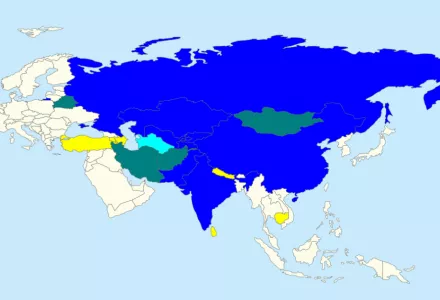
The Russian/Chinese-led bloc is expected to approve Iran's accession this week amid uncertainty over President Raisi's foreign posture and ongoing turmoil in Afghanistan.
PolicyWatch 3532
On September 16, Iran’s newly inaugurated President Ebrahim Raisi will embark on his first foreign trip to attend the twentieth-anniversary summit of the Shanghai Cooperation Organization (SCO) in Tajikistan. Russian special envoy for SCO affairs Bakhtiyor Khakimov has indicated that a major item on the agenda will be moving forward with Tehran's longstanding application for full membership—an initiative that may proceed despite the notable absence of leaders Vladimir Putin and Xi Jinping, both of whom are isolating due to COVID-19. Although the direct benefits of this decision would be modest for Iran, the news still represents a major diplomatic victory for Raisi at a time when his government faces pressing questions over stalled nuclear talks in Vienna, the Taliban takeover of Afghanistan, and the perpetual challenge of regime survival.
Iran's Long Road to Membership
The SCO grew out of the "Shanghai Five" format, which involved a series of meetings in 1996–1997 over border issues between China and its neighboring Soviet successor states Russia, Kazakhstan, Kyrgyzstan, and Tajikistan. In 2001, Uzbekistan joined them to formally establish the SCO, broadening the bloc's scope to encompass economic, cultural, and security cooperation aimed at combating what Beijing describes as the "three evils": terrorism, separatism, and extremism....
Grajewski, Nicole. “Iranian Membership in the Shanghai Cooperation Organization: Motivations and Implications.” Washington Institute for Near East Policy, September 15, 2021
The full text of this publication is available via Washington Institute for Near East Policy.



